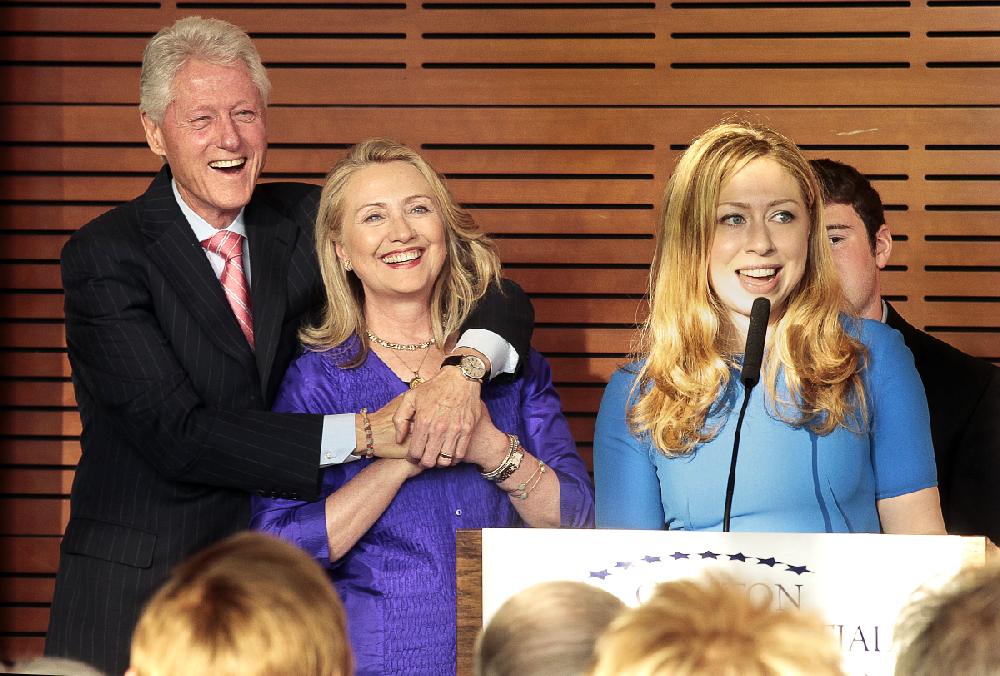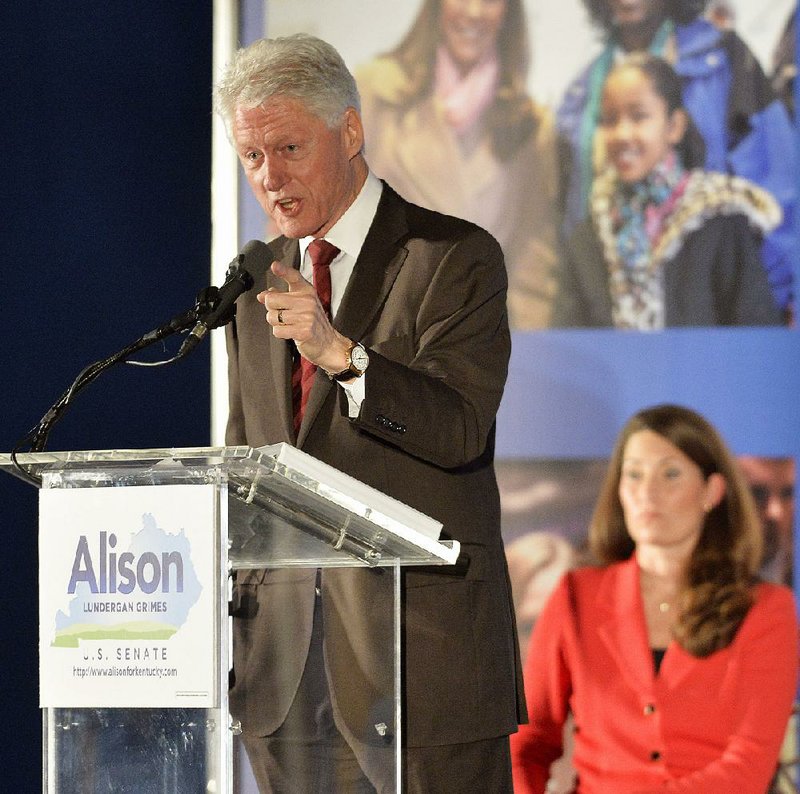LOUISVILLE, Ky. - For Democrats anxious about preserving their Senate majority in a difficult midterm election year, Bill Clinton on Tuesday suggested a path forward: Defend the federal health-care law, recommit to a populist theme of rising wages and economic growth, and go after the outside groups flooding the airwaves with negative ads.
The former president made his first campaign stop of 2014 in Kentucky to boost the candidacy of Alison Lundergan Grimes, a Clinton protege and family friend who is running to unseat Republican Senate Minority Leader Mitch McConnell.
President Barack Obama and his signature health-care law are deeply unpopular in the state. But Clinton strongly defended the law, acknowledging it was complicated but arguing that it has given more people in Kentucky access to affordable health care and reduced their costs.

Clintons
He also repeatedly praised Democratic Kentucky Gov. Steve Beshear, a leading proponent of the law, and laid blame on McConnell and other Republicans for creating what Clinton called “constant conflict.”
“You know what, in a sane environment, people do when they have problems?” Clinton said. “They fix the problems. In the end, that’s really what Alison’s saying: ‘Send me to Washington, I’ll do something that makes sense, and I’ll fix it.’ The other choice is to just pout … and make as many problems as you can, stop anything good from happening - and if you can’t stop it, at least bad-mouth it.”
Grimes never mentioned the health-care law in her nearly 30-minute speech, nor did she refer to Obama. Instead, she spoke nostalgically about the Clinton presidency, summing up those eight years as “goodbye, recession; hello, prosperity.”
Today, Grimes said, “ Washington is broken and dysfunctional. … It’s not progress and prosperity that we see. It’s obstruction and gridlock.”
Grimes said that, like Clinton in 1992, she can take “a new Southern face of leadership” to the nation’s capital.
Clinton is popular in Kentucky, where his Arkansas roots, deep friendships, and love of college basketball and horse racing help him connect with voters who otherwise turn away from national Democrats. Clinton was the last Democratic presidential candidate to win the Bluegrass State, which he carried twice.
But McConnell said Tuesday that Clinton’s popularity has not always transferred to other candidates. “I welcome him back to Kentucky,” McConnell said on Capitol Hill. “Every time he’s come, it’s been really good for me.”
In his remarks in Louisville, Clinton delved into the economic agenda Democrats hope can carry them through November’s midterm elections. Raising the minimum wage is at the top of that list,Clinton said, and he held up a copy of Grimes’ jobs plan in the air as proof that she has substantive ideas.
Clinton said the growing gap between the rich and the poor was “self-defeating” and becoming “a severe limit” on economic growth across the country, including in rural Kentucky.
“Americans don’t resent people who make money, but what we do resent is the unfairness of a system that depends on holding people’s incomes down,” Clinton said.
Grimes and Clinton both used McConnell as a foil, with Grimes noting that McConnell has become a multimillionaire during his 29 years in the Senate and Clinton pointing out that many of the Republican’s key supporters are millionaires and billionaires.
“He got all this money from all these guys who don’t ever want anything to change and haven’t noticed that, adjusted for inflation, median family income in Kentucky and in America is lower today than it was the day I left office,” Clinton said.
Clinton angrily sounded off about the millions of dollars already being spent by pro-Republican super political action committees on attack ads in Kentucky and other key battlegrounds. Clinton said the ads ultimately could discourage practical voters from going to the polls in November, resulting in a more ideologically rigid electorate.
“Politics is not rocket science,” Clinton said. “It’s either creative cooperation or constant conflict. It’s either a focus on people or a focus on keeping yourself in power by keeping the people so torn up and upset that they can’t think anymore.”
Clinton continued, “You cannot run a hateful television ad and put a single mother to work or raise income.”
Clinton intends to campaign this year for Democrats across the nation, including, as in past election years, stops in conservative states where hostility to Obama runs high but where Clinton is relatively popular.
Clinton is certain to be a frequent visitor to Arkansas, where several longtime friends and political allies are on the ballot in November, including Democratic Sen. Mark Pryor, who has a difficult path to re-election, and former Democratic congressman Mike Ross, who is running for governor.
Front Section, Pages 4 on 02/26/2014

